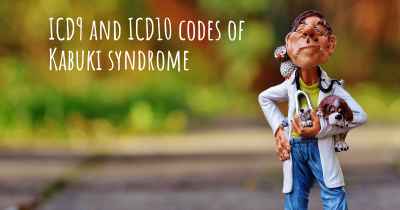Which are the causes of Kabuki syndrome?
See some of the causes of Kabuki syndrome according to people who have experience in Kabuki syndrome

Kabuki syndrome is a rare genetic disorder that affects multiple parts of the body. It was first described in Japan in 1981 and is named after the traditional Japanese theater style, as individuals with this syndrome often exhibit distinct facial features and unique behavioral characteristics.
The exact cause of Kabuki syndrome is not yet fully understood. However, it is believed to be primarily caused by spontaneous mutations in the genes responsible for normal development. These mutations occur randomly during the formation of reproductive cells or early embryonic development, leading to alterations in the genetic instructions that govern various aspects of growth and development.
Research has identified two genes that are commonly associated with Kabuki syndrome: KMT2D (also known as MLL2) and KDM6A. These genes play crucial roles in regulating gene expression and controlling the development of various tissues and organs in the body. Mutations in either of these genes can disrupt normal development and contribute to the characteristic features and symptoms of Kabuki syndrome.
Kabuki syndrome is not inherited in a typical autosomal dominant or recessive pattern, where the condition is passed down from affected parents to their children. Instead, it usually occurs as a result of de novo mutations, meaning the genetic changes are not present in the parents' DNA but arise spontaneously in the affected individual.
While the exact triggers for these spontaneous mutations are not known, several factors may increase the likelihood of their occurrence. Advanced parental age, particularly in fathers, has been associated with a higher risk of de novo mutations. Environmental factors and exposures during pregnancy may also play a role, although specific causative agents have not been identified.
Kabuki syndrome affects various systems and organs in the body, leading to a wide range of symptoms and features. The most notable characteristics include distinctive facial features such as arched eyebrows, long eyelashes, widely spaced eyes, and a flattened nasal tip. Individuals with Kabuki syndrome may also have skeletal abnormalities, intellectual disability, developmental delays, and short stature.
Other common features of Kabuki syndrome include hearing loss, heart defects, immune system abnormalities, endocrine disorders, and gastrointestinal issues. The severity and combination of symptoms can vary widely among affected individuals, making each case unique.
Diagnosing Kabuki syndrome can be challenging due to its variable presentation and the lack of specific diagnostic tests. However, a clinical evaluation by a geneticist or other medical specialists familiar with the syndrome's features can help in making an accurate diagnosis. Genetic testing can also be performed to identify mutations in the KMT2D or KDM6A genes, although not all individuals with Kabuki syndrome will have detectable mutations in these genes.
Although there is currently no cure for Kabuki syndrome, early intervention and management of symptoms can greatly improve the quality of life for affected individuals. Treatment may involve a multidisciplinary approach, addressing the specific needs of each individual. This may include therapies to support developmental delays, educational interventions, hearing aids or cochlear implants for hearing loss, surgical interventions for heart defects, and ongoing medical care to manage associated health issues.
In conclusion, Kabuki syndrome is a complex genetic disorder primarily caused by spontaneous mutations in the KMT2D or KDM6A genes. The exact triggers for these mutations are not fully understood, but advanced parental age and environmental factors may play a role. The syndrome affects multiple systems and organs in the body, leading to a wide range of symptoms and features. Early diagnosis and intervention are crucial in managing the condition and improving the overall well-being of individuals with Kabuki syndrome.








